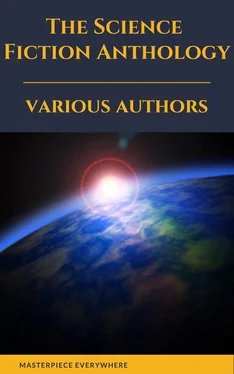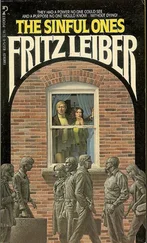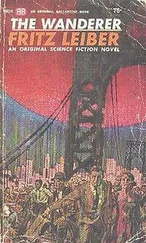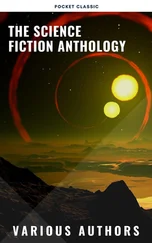The effort was futile, for there were many victims who had sickened and grown partially well again without recognizing the strangeness of their illness.
Three years later they reached the carrier stage and the epidemic spread to four cities. Three more years, and there was an epidemic which spread around the world, meeting another wave coming from the opposite direction. It killed two out of four, fifty out of a hundred, twenty-seven million out of fifty million. There was hysteria where it appeared. And where it had not appeared there were quarantines to fence it out. But it could not be fenced out. For two years it covered the world. And then it vanished again, leaving the survivors with a tendency toward glandular troubles.
Time passed. The world grew richer, more orderly, more peaceful.
A man paused in the midst of his work at the U.N. Food and Agriculture Commission. He looked up at the red and green production map of India.
“Just too many people per acre,” he said. “All our work at improving production ... just one jump ahead of their rising population, one jump ahead of famine. Sometimes I wish to God there would be another plague to give us a breathing spell and a fair chance to get things organized.”
He went back to work and added another figure.
Two months later, he was one of the first victims of the second plague.
In the dining hall of a university, a biochemical student glanced up from his paper to his breakfast companion. “You remember Johnny, the mythical carrier that they told about during the first and second epidemics of Syndrome Plague?”
“Sure. Syndrome Johnny. They use that myth in psychology class as a typical example of mass hysteria. When a city was nervous and expecting the plague to reach them, some superstitious fool would imagine he saw Syndrome Johnny and the population would panic. Symbol for Death or some such thing. People imagined they saw him in every corner of the world. Simultaneously, of course.”
It was a bright morning and they were at a window which looked out across green rolling fields to a towering glass-brick building in the distance.
The student who had gone back to his paper suddenly looked up again. “Some Peruvians here claim they saw Syndrome Johnny—”
“Idiotic superstition! You’d think it would have died down when the plague died.”
The other grinned. “The plague didn’t die.” He folded his newspaper slowly, obviously advancing an opening for a debate.
His companion went on eating. “Another of your wild theories, huh?” Then through a mouthful of food: “All right, if the plague didn’t die, where did it go?”
“Nowhere. We have it now. We all have it!” He shrugged. “A virus catalyst of high affinity for the cells and a high similarity to a normal cell protein—how can it be detected?”
“Then why don’t people die? Why aren’t we sick?”
“Because we have sickened and recovered. We caught it on conception and recovered before birth. Proof? Why do you think that the countries which were known as the Hungry Lands are now well-fed, leisured, educated, advanced? Because the birth rate has fallen! Why has the birth rate fallen?” He paused, then very carefully said, “Because two out of three of all people who would have lived have died before birth, slain by Syndrome Plague. We are all carriers now, hosts to a new guest. And”—his voice dropped to a mock sinister whisper—”with such a stranger within our cells, at the heart of the intricate machinery of our lives, who knows what subtle changes have crept upon us unnoticed!”
His companion laughed. “Eat your breakfast. You belong on a horror program!”
A police psychologist for the Federated States of The Americas was running through reports from the Bureau of Social Statistics. Suddenly he grunted, then a moment later said, “Uh-huh!”
“Uh-huh what?” asked his superior, who was reading a newspaper with his feet up on the desk.
“Remember the myth, of Syndrome Johnny?”
“Ghost of Syndrome Plague. Si, what of it?”
“Titaquahapahel, Peru, population nine hundred, sent in a claim that he turned up there and they almost caught him. Crime Statistics rerouted the report to Mass Phenomena, of course. Mass Phenomena blew a tube and sent their folder on Syndrome Johnny over here. Every report they ever had on him for ninety years back! A memo came with it.” He handed the memo over.
The man behind the desk looked at it. It was a small graph and some mathematical symbols. “What is it?”
“It means,” said the psychologist, smiling dryly, “that every crazy report about our ghost has points of similarity to every other crazy report. The whole business of Syndrome Johnny has been in their ‘funny coincidence’ file for twenty years. This time the suspect hits the averaged description of Johnny too closely: A solid-looking man, unusual number of visible minor scars, and a disturbing habit of bending his fingers at the first-joint knuckles when he is thinking. The coincidence has gotten too damn funny. There’s a chance we’ve been passing up a crime.”
“An extensive crime,” said the man at the desk softly. He reached for the folder. “Yes, a considerable quantity of murder.” He leafed through the folder and then thought a while, looking at the most recent reports. Thinking was what he was paid for, and he earned his excellent salary.
“This thumbprint on the hotel register—the name is false, but the thumbprint looks real. Could we persuade the Bureau of Records to give their data on that print?”
“Without a warrant? Against constitutional immunity. No, not a chance. The public has been touchy about the right to secrecy ever since that police state was attempted in Varga.”
“How about persuading an obliging judge to give a warrant on grounds of reasonable suspicion?”
“No. We’d have the humanist press down on our necks in a minute, and any judge knows it. We’d have to prove a crime was committed. No crime, no warrant.”
“It seems a pity we can’t even find out who the gentleman is,” the Crimes Department head murmured, looking at the thumbprint wistfully. “No crime, no records. No records, no evidence. No evidence, no proof of crime. Therefore, we must manufacture a small crime. He was attacked and he must have defended himself. Someone may have been hurt in the process.” He pushed a button. “Do you think if I send a man down there, he could persuade one of the mob to swear out a complaint?”
“That’s a rhetorical question,” said the psychologist, trying to work out an uncertain correlation in his reports. “With that sort of mob hysteria, the town would probably give you an affidavit of witchcraft.”
“Phone for you, Doctor Alcala.” The nurse was crisp but quiet, smiling down at the little girl before vanishing again.
Ricardo Alcala pushed the plunger in gently, then carefully withdrew the hypodermic needle from the little girl’s arm. “There you are, Cosita,” he said, smiling and rising from the chair beside the white bed.
“Will that make me better, Doctor?” she piped feebly.
He patted her hand. “Be a good girl and you will be well tomorrow.” He walked out into the hospital corridor to where the desk nurse held out a phone.
“Alcala speaking.”
The voice was unfamiliar. “My deepest apologies for interrupting your work, Doctor. At this late hour I’m afraid I assumed you would be at home. The name is Camba, Federation Investigator on a health case. I would like to consult you.”
Alcala was tired, but there was nothing to do at home. Nita was at the health resort and Johnny had borrowed all his laboratory space for a special synthesis of some sort, and probably would be too busy even to talk. Interest stirred in him. This was a Federation investigator calling; the man’s work was probably important. “Tonight, if that’s convenient. I’ll be off duty in five minutes.”
Читать дальше










